
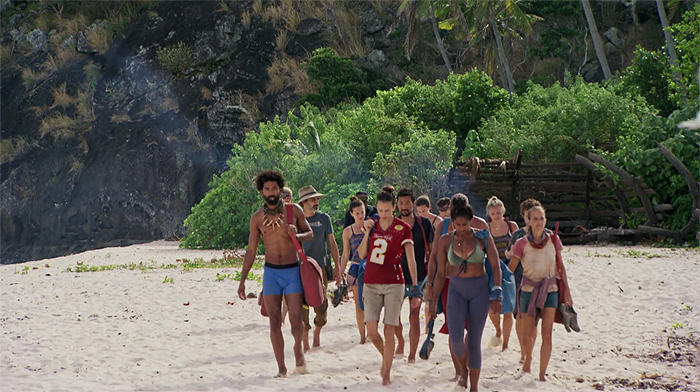
For the first time in a couple of decades, there's a Survivor offseason of uncertain duration looming, just two days away. And now, with two of the key elements of this season (fire tokens and Edge of Extinction) finished off in Episode 13, this is a great opportunity to talk about what worked, what didn't, and what could be changed with the twists and format changes from this season.
So as we prepare for a (mostly) distraction-free finale of a (hopefully) great season and prepare to crown the winner, let's dispense with the secondary format/twist criticisms that might otherwise bog down the post-finale recap/analysis ahead of time, too.
Ending Edge of Extinction
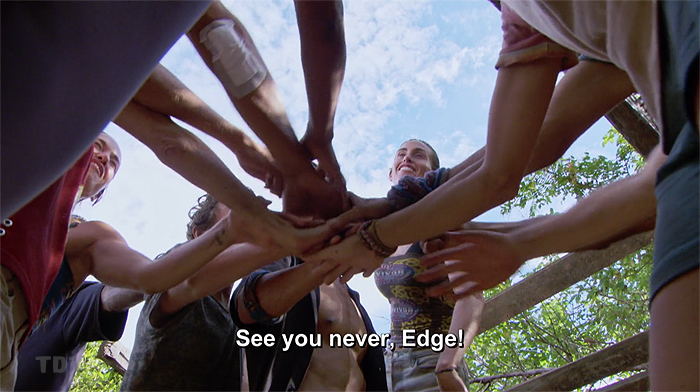
One welcome feature of this extended episode was skipping ahead to morning 35 after the second boot. This meant we got to witness the dismantling of Edge of Extinction, and saw the Stockholm Syndrome-afflicted residents bid it adieu, as voiced by Amber. We also saw the Edgers cashing in their fire tokens for advantages, and heading out to the re-entry challenge.
With so many Edge residents having met the two-token threshold for advantage purchase, this could have been a time-consuming process. Now it won't be gobbling up time in a finale that already has four challenges, three eliminations, and a final Tribal Council and jury vote to get through. It also means fans have a fully informed view about who has purchased what advantages and/or idols prior to the re-entry challenge. (Well ... almost, as with anything Edge-related.)
Leading the pack, Natalie ended up with 14 (fourteen!) fire tokens, and she should therefore be a heavy favorite to get back in the game. She racked up that total mostly because (1) she's a physical machine, dominating the grueling endurance-based tasks on EoE, and (2) she's spent so long on EoE that she knows every inch of the place, and has been present for every fire token opportunity. (In contrast, Jeremy spent three days there and had zero chances to earn tokens.) Natalie had so many tokens that she was able to buy all three (now doubled in price) challenge advantages, and still had enough left over to buy food and an extra idol for Tyson.
(Was Natalie *not allowed* to buy another idol for herself? Doing so would guarantee her free passage all the way to F4 firemaking. If this is indeed a rules decision, it seems a bit off-brand for Probst-led Survivor. After all, she "earned it." But then again, she did make the poor choice of not being Boston Rob.)
Clearly, Natalie put in a huge amount of effort and went through some serious deprivation on the Edge, and she reaped the rewards for doing so, to an extreme degree. She almost literally got everything she possibly could have out of her Edge of Extinction experience.
The problem is, she wasn't playing Survivor. She voted zero people out. She was voted out herself in the sole Tribal Council she attended. She has so far participated in just two challenges, one on Day 1, one on Day 19. She won neither of those. Yet if she reached the final three, she seems universally respected by the jurors (at least based on their comments while on the Edge), and would probably win the jury vote easily. Despite playing just six days (if she reaches Day 39) of the real game.
This is the fundamental flaw of Edge of Extinction. Natalie wrung every ounce of advantage she could from the consolation round. But again, she wasn't really playing Survivor, even when — or especially while — she was interfering with it from afar. Nobody in the game knows that she extorted six tokens out of Tony, nor that she sold the challenge disadvantage to Nick (which he then played against Ben), nor that she sold Jeremy his Safety without Power advantage. Furthermore, if she gets back in, she has no reason to tell anyone, so there's no incentive for anyone to vote her out for those actions.
She was basically Rob and Sandra in Island of the Idols, just without the statues, producer credit, or appearance fees. Things she sent into the game affected the gameplay, but the people affected had no recourse — they couldn't retaliate against Natalie, because (1) they had no idea it was her, and (2) there was nothing they could do to her, even if they did. That goes against the entire concept of the "zero sum game" Probst keeps swearing this show is. Other people can lose, or temporarily win, but their doing so has no effect whatsoever on Natalie. There is no balance.
Shouldn't it be enough that by spending 33 days on the Edge, Natalie knocked Reem Daly off the throne for most Exile/EoE days played, both single-season and career? And, rather than trying to top that again in the next iteration, how about we just end Edge of Extinction and Redemption Island and every other variant of the backdoor win circuit altogether? For all the reasons above, and because Chris Underwood already won this way once. This is not an experiment that needs to be repeated.
Previewing the re-entry challenge
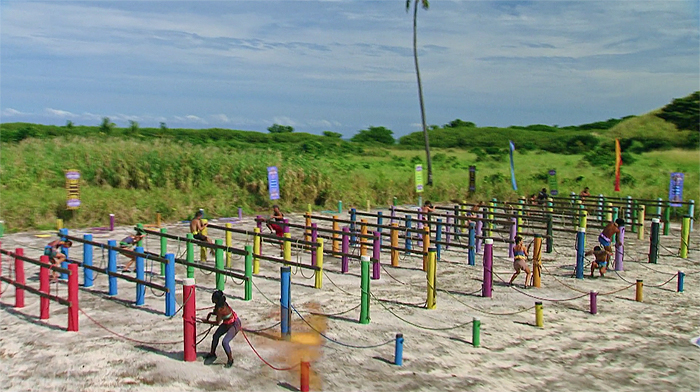
Whether or not we're permanently done with the Edge, there are still three key Edge-related questions this season: Who will return to the game on Day 35? Will that person reach the finals? And if they do, will they win, as the aforementioned Chris Underwood did?
So we have Natalie with all three advantages, which (see @RobsFactChecker's twitter thread explaining the advantages) allows her to skip (1) half of the initial ropes course obstacle, (2) a digging task, and (3) part of the rope bridge construction. We also saw Parvati, Wendell, and Yul trading in their two tokens for the first advantage (as is also visible above). Sophie and Tyson also had at least two fire tokens. We were not shown either of them buying an advantage, but presumably they did. Tyson's token total was back down to zero, anyway.
How much do these advantages matter, though? That first rope-on-a-fence obstacle is pretty time-consuming, and the (six?) people who skipped past it should all have a decent headstart on the rest of the challenge. The second and third advantages seem less necessarily useful. Digging is mostly luck, and someone could easily complete that task in a few seconds. Similarly, the rope bridge task doesn't usually require any special ability. It's not a puzzle, it just takes time. The final stage, as with the final re-entry challenge stage in Edge of Extinction, is landing two balls on a table maze. That's the equalizer.
The big question for Natalie here is: How good is she at a fiddly, concentration-intensive task like the table maze? It's not one where endurance or physical ability really matters. Table mazes are their own beast, requiring their own set of skills. Coach was somehow able to beat out challenge beast JT on one in Tocantins. Earlier this season, Sophie and Nick (both of whom are now in this return challenge) did quite well with a hanging table maze. Jeremy and Kim, alas, did not.
So there's no guarantee an overpowered Natalie will breeze back into the game here, even with three advantages. She's still probably the favorite, but Sophie could give her some formidable opposition. Remember, this element and this challenge was supposed to be Joe Anglim's challenge to lose in Edge of Extinction, and lose it he did, by seconds.
Sad as it is to say, because you have to admire Natalie's determination, but for the integrity of the game, maybe it's best if Sophie (or at least someone other than Rob, Tyson, or Natalie) does pull off the come-from-behind victory here. They'll have a swift, idol-free trip to Ponderosa the next day, and the Edge threat will finally be extinguished.
Fire token verdict: Plenty of potential, haphazardly executed
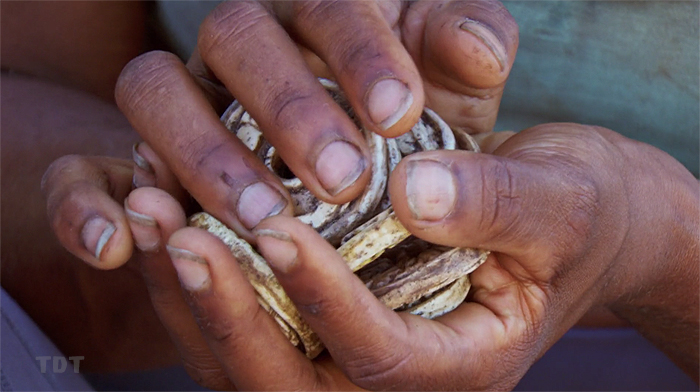
Fire tokens still have enormous potential (which we'll get to in the next section), but the show really needs to figure out (1) what story it wants to tell with them, and (2) how to get that story across to the audience in a consistent manner.
One of the most frustrating things about fire tokens this season was the lackadaisical approach the show took in keeping the audience informed about who had how many, and when. Some weeks, a player's fire token totals were shown in their lower third. Other weeks (like last episode, when the people on the Edge were literally talking about a race to acquire fire tokens) they weren't. This made it difficult to keep track of events that were token-related, but not shown on-screen.
For example, it took until the final minutes of the second-to-last episode to discover (and then, only by inference) that prices actually did go up on the fire token menu at Edge of Extinction after the merge. (Tony had an inaccurate confessional stating this in the merge episode, which made no sense since he was referring to the in-game menu, which did not go up.) Giving the audience a visual reference — even a single frame that we can pause on — that showed each menu would have solved this, and let us appreciate and ponder what temptations the contestants were facing, what they could be contemplating spending tokens for, and so on. It helps us understand what the value of the tokens really is. Better luck next all-winners season, apparently.
Fire tokens are also supposed to be currency, designed to change hands, and were most exciting when they actually did so: Tony borrowing from his allies to pay the Extortion price, Nick borrowing from Michele to buy the disadvantage. But the show never bothered to inform the audience whether these transactions were ever paid back — we literally had to back-calculate from Jeremy's total when leaving this episode, and Nick's total when buying the disadvantage, to realize that Tony had in fact repaid both of them. Similarly, while a big deal was made of Danni and Parvati finding and deploying the 50-50 coin advantage, and Natalie (and apparently not Parvati) getting the Extortion one, the show never followed up on who received those tokens, and how they were spent. Tyson buying peanut butter was fun! Show Parvati doing that, too! Even in a secret scene would be fine. Just give us the information, if these tokens are so important.
Maybe production was grumpy that everyone in-game just hoarded their tokens, rather than purchasing items off the menu (such as sending a letter to the Edge). The only times tokens changed hands in-game was Michele giving Wendell a token after Parvati left, and the two times (Tony, Nick) someone from the Edge demanded a ridiculously high price for their wares.
So despite Nick's Ep.1 confessional that "the winner of this season will be the one who was able to use the currency correctly," there's not much evidence of anyone doing that, at least not in the regular game (again, unless they were just too lazy to tell us about it). But there could have been, and it would be relatively simple for the show to encourage that.
Fire tokens could work just fine without the Edge
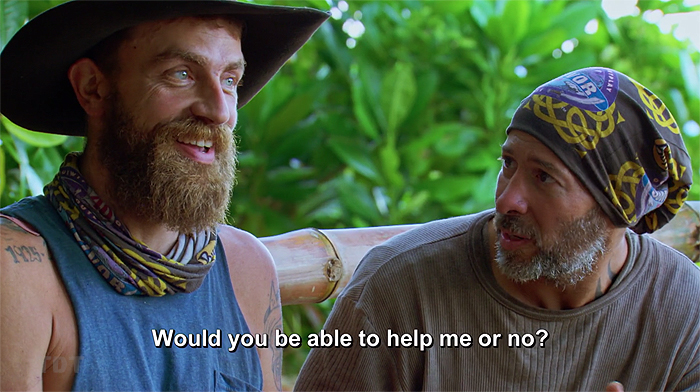
In retrospect, it's clear that fire tokens were mostly intended as a way to keep people on the Edge invested and interested in participating in all the many labor-intensive tasks. Rather than a handful of advantages being handed out at random over 35 days as in S38: Edge of Extinction, building up a stock of tokens gave the ex-winners a chance to build up an Edge (sorry) in the return challenge.
While that's somewhat interesting, it's also an ultimately futile task for all but one person, and it doesn't really intersect with the regular Survivor game in most cases. Nobody in the game even knew about the log task, or running around the island collecting coconuts. It's mostly just pointless busy work, and not even that entertaining to watch, apart from Ethan's struggle with the logs.
But again, the fire tokens *were* interesting when they were needed in-game. Tony scrambling to cobble together enough tokens to avoid being barred from winning immunity and voting revealed a lot about how close he was to people like Ben, Jeremy, and Nick. Similarly, Nick realizing he wasn't as wealthy as he needed to be when he finally received an offer demonstrated his connection with Michele. These aspects of fire tokens could easily be replicated in a normal, Edge-free season. It's not that hard. Here are the basic outlines of how that might work:
- No Edge of Extinction (please).
- Every player starts off with a single fire token, just as in Winners at War.
- Camp menus offer similar survival items (rice, beans, tarps) as before, but now they also offer advantages (Extra vote, etc.), but for exorbitant prices — an entire starting tribe *could* pool their tokens to buy one advantage, if they wanted, but obviously there's little chance of that happening. Key hidden feature here: Available advantages are listed ahead of time, so everyone is aware they *could* be in play. This makes the game more fair, while potentially increasing the paranoia.
- All purchased advantages should have a 1- to 2-Tribal Council expiration date, so people have further incentive to only buy them if/when they need them. That should also prevent hoarding, and help avoid another Advantage-geddon.
- Bequeathing after being voted out works the same as in S40. As the game progresses, people still playing will gradually acquire more and more tokens. Also, for a tribe that gets decimated early like Matsing, a theoretical Denise and Malcolm would emerge from the wreckage with six tokens between them, which might be enough to purchase a key item that keeps them from simply being wiped out by the other two tribes. (For one vote, at least).
- Maybe give players the option *not* to bequeath, if they prefer? Have a fire next to the boxes into which a departing player can toss their tokens instead?
- Single tokens (and idols) could also be available near camp. (Maybe one per camp.) Hide one or two at rewards as well. This sets up an individual vs. collective battle as with prior advantages.
- Individual immunity winners continue to get tokens after the merge. This is also an incentive for production to have individual reward challenges as well.
The pros of this approach are many: There's still an incentive for players to pool tokens. People who are well-liked will get more tokens. There's continued incentive to connect with people and not burn bridges, which keeps the game fluid, and avoids rigid alliance lines. Tokens could give a lifeline to someone who's outside the numbers, but otherwise doing well socially, which could help break up a Pagonging in the post-merge.
Still, there are always potential cons. For example, there's a danger of a large majority alliance pooling their tokens to thwart an idol, or to buy some other advantage to actually protect and prolong a Pagonging. Despite that, there's more pressure on a minority group to band together and pool resources than there is for a large majority who already have the numbers. Nothing is perfect in the first draft, but fire tokens have the potential to keep the game interesting, and perhaps even a bit more fair.
Shorter takes
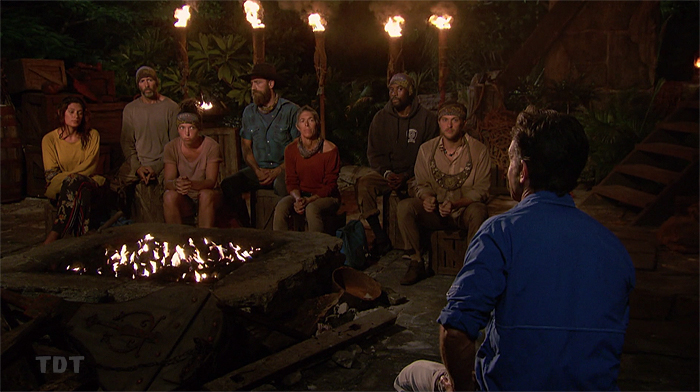
- Trust falls: The first Tribal Council's discussion of the lingering post-game psychological effects of playing Survivor, even among people who won, was a welcome peek into a part of the game that's rarely discussed. Jeremy talked about not trusting even his fellow firefighters, people with whom he entrusts his life, after getting back from Cambodia. We also saw great confessionals that season about the mental toll of getting to the end and not winning, especially from Stephen Fishbach. This is a tough game. In light of many members of this season's cast being harassed off of social media, this was a welcome topic to try to get across to the audience. These are real people, putting themselves through an incredibly stressful crucible for your entertainment. They say "it's just a game," but it clearly isn't. If you feel the need to attack the contestants on social media for doing something that mildly displeases you, please ... just stop.
- Storytelling gaps in continuity: This week, we learned that (in Ben's eyes, at least) he and Denise are "in lockstep." (The editors helpfully supplied a shot of Denise massaging Ben's arm as evidence.) This is news, because since the swap Denise has been shown almost exclusively as working with Kim (except last week, when she supposedly formed a final three pact with Nick and Michele). Meanwhile, Ben has, for the past two weeks, been the third wheel/extra number in Cops R Us. It feels weird to object to this, because way back in Episode 2, we did see Ben and Denise together, as Ben helped Denise find her idol, and they discussed how best to play it. So they probably actually have had a close relationship since Day 4 (interrupted by the swap), we just weren't shown any of that after the merge. Just one of those things that gets cut for time when you're forced to watch people endlessly jogging in a separate minigame, apparently.
- The recap nobody needed: It's unclear why the season-long recap that normally kicks off the finale was here, at the end of Episode 13. An obvious reason could be that with so many challenges and Tribals to get through in the finale, they didn't have room there. Still, it felt weird to end an already long episode with a (very long) recap. As Shannon Guss said, if you're still watching after two hours of the 13th episode, you probably don't need a recap, whereas if you're a casual viewer who's just tuning into the finale, that intro probably helps orient you. Which is why it's always been there. So ... if it's also there in the finale, then it was a waste of our time here. If it's not there, okay? I guess?
- Twenty minutes of perfection: In contrast to the seemingly misplaced recap, the opening 20 minutes of the episode were a taut, tightly edited, perfect balance of characters, action, and strategy. We had comedy, in Jeremy and Tony's argument about days in the week, a character depth segment, where Denise and Michele talked about Denise's plans for "endure" and "let go" tattoos, and strategy, with a Sarah-led scheme where she and Tony guided Ben into believing it was his own idea to target Nick. Then the immunity challenge thwarted that plan, but all that happened in just 20 minutes. Why can't we have this more often? (It helped that we didn't bother to check in with the Edge.)
 Jeff
Pitman is the founder of the True Dork Times, and
probably should find better things to write about than
Survivor. So far he hasn't, though. He's also responsible
for the Survivometer, calendar, boxscores, and contestant
pages, so if you want to complain about those, do
so in the comments, or on twitter: @truedorktimes
Jeff
Pitman is the founder of the True Dork Times, and
probably should find better things to write about than
Survivor. So far he hasn't, though. He's also responsible
for the Survivometer, calendar, boxscores, and contestant
pages, so if you want to complain about those, do
so in the comments, or on twitter: @truedorktimes
Other Winners at War Episode 13 recaps and analysis
- Gordon Holmes at XfinityTV.com: "Dance Like the Jury is Watching"
- Dalton Ross at EW.com: "Double elimination smackdown!"
- Dalton Ross & Jeff Probst at EW.com: Q&A
- Andy Dehnart at Reality Blurred: "Will the '100 percent together' alliance be the final three?"
Podcasts
- Rob Cesternino & Stephen Fishbach at RHAP: "Know-It-Alls | Winners at War Episode 13 Recap"
- Rob Cesternino at RHAP: "Survivor 40 Episode 13 Recap with Peih-Gee Law"
- Shannon Guss at RHAP: "Survivor Global | Winners at War Episode 13 Recap | A.K. Knight"
- Andy & John at The Purple Rock Podcast: "Winners at War Episode 13: The Penultimate Step of the War"
- Dom Harvey & Colin Stone at The Dom & Colin Podcast: "Jersey Sore -- Episode 13 Recap/Analysis"
- Dwaine Stroud & David Jones at Survivor Talk w/ D&D: "Survivor Winners at War, Episode 13 Recap"
- Ryan Elder & Scott Chernoff at Snakes, Rats & Goats: "Survivor Winners at War Ep. 13 w/ Sam Brown"
ADVERTISEMENT